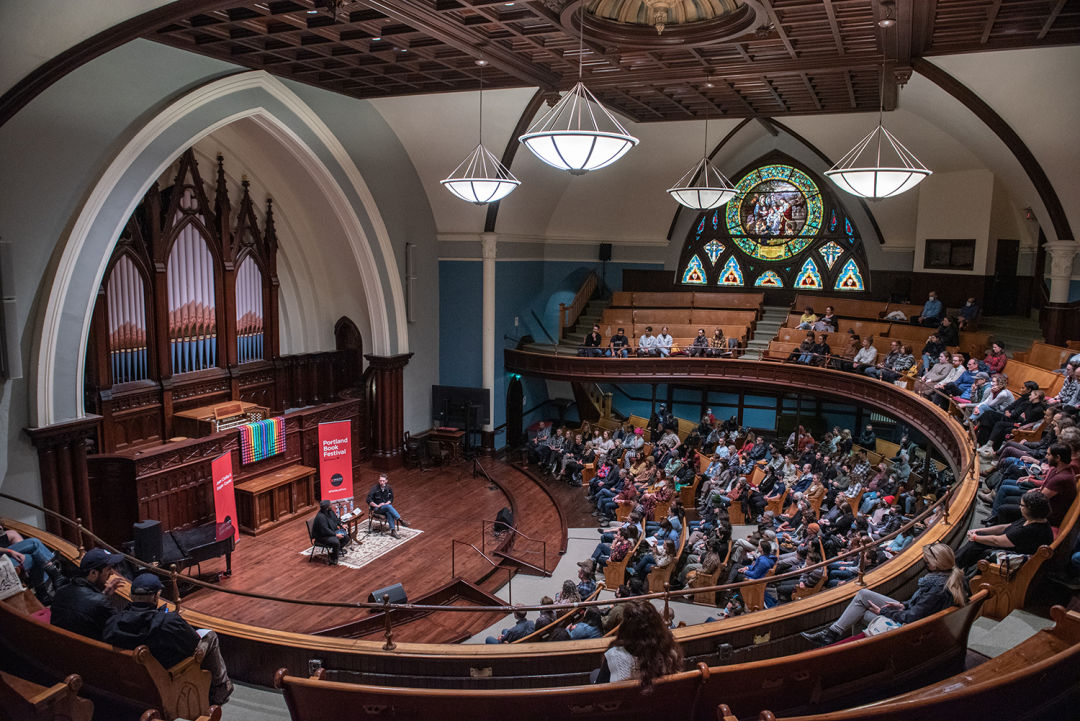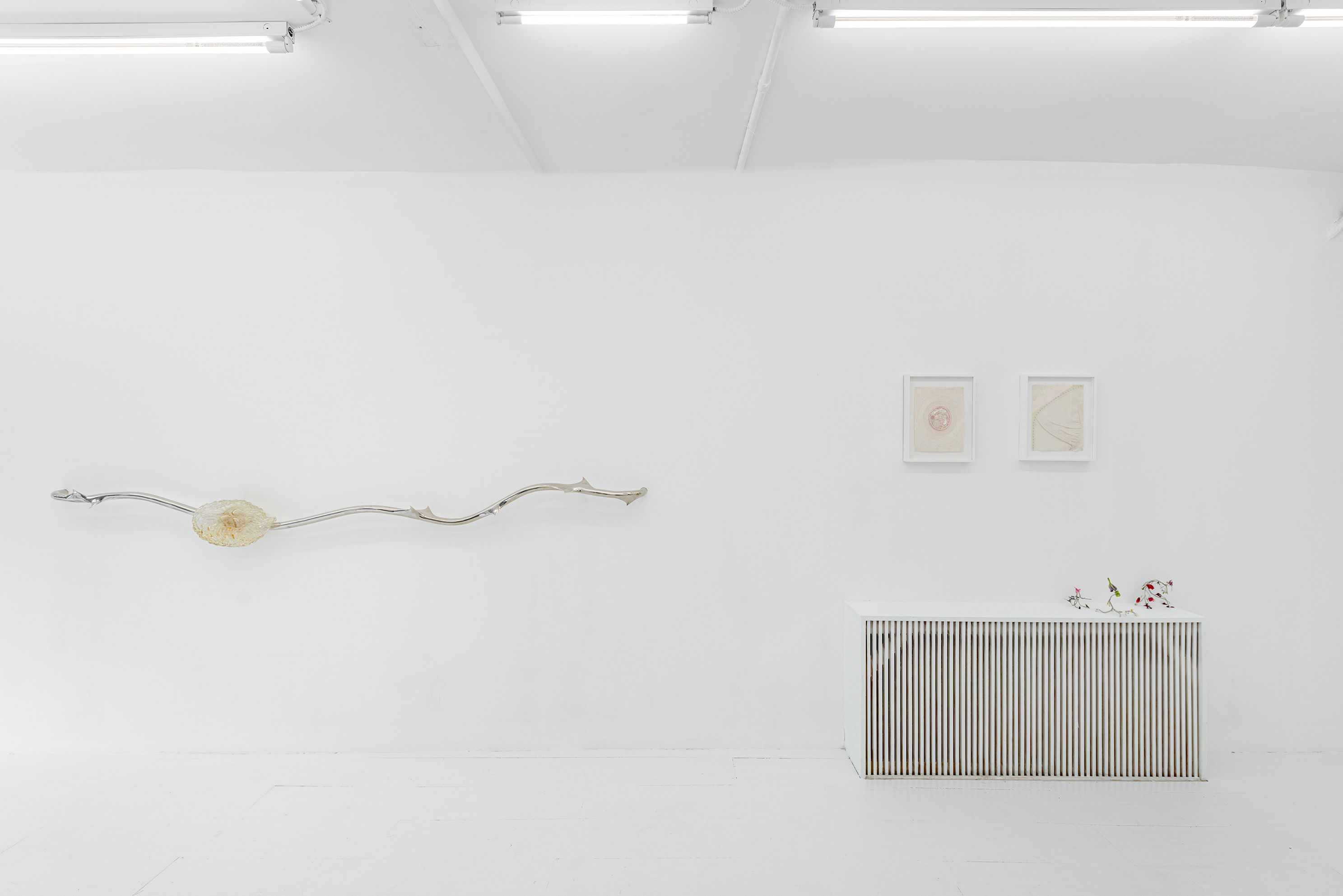Why Are Portland Fall Arts Festivals So Unusual This Year?

Robert Rauschenberg’s Signs, edition 44/250
If you live in Portland, you know that autumn brings short days, rain, and more arts events than you can pencil into your calendar, as if Portland arts administrators conspire to coordinate their events with a backdrop of falling leaves. But this year’s programming appears alarmingly thin: no Oregon Contemporary Portland Biennial, no nationally acclaimed Time-Based Arts Festival, no Artists Repertory Theater season. On top of that, the city’s main public arts organization is losing funding. Is the Portland arts scene collapsing?
No, quite the contrary. We’re slated for the biggest fall arts season in recent history, centered around a massive biennial and a star-studded lecture series. Here’s what’s happening.
Jump to:
- The Biennial That Is Happening
- No Oregon Biennial?
- No Time-Based Arts Festival?
- Portland Book Festival and Arts & Lectures
- Slashed City Arts Funding?
How exactly is Portland hosting a giant biennial?
The previously-little-known arts organization Converge 45 is hosting their third biennial, expecting 60,000 visitors at 17 venues across the city, from late August to October. (Read our guide. The roster is dizzying.) The organization launched seven years ago, when gallerist Elizabeth Leach banded together arts administrators and business leaders. “It’s our proof of concept year,” says artistic director Derek Franklin. “On the precipice of all the press around Covid and the fentanyl pandemic, we’re hopeful that this is something that puts Portland on the map as an arts travel destination,” he says.
His expectation has precedence. The biennial model traces to Europe, namely the 128-year-old Venice Biennale. Closer to home, the 2008 Prospect Triennial helped New Orleans recover post–hurricane Katrina, rebranding the music and food town as an arts hub. These festivals seek to broadly unite existing arts communities (artists, emerging talent, neighbors, connoisseurs) while attracting a robust chunk of art tourists. Christian Viveros-Fauné is this year’s guest curator, and he’s something of a festival aficionado, having curated the 2009 Canary Islands Biennial and the 2011 Dublin Contemporary. (He’s also cofounder of the arts publication the Brooklyn Rail, and former art critic of the Village Voice.) He views Portland as a city that “punches above its weight, culturally.”
Wasn’t the Oregon Contemporary Biennial supposed to be this year?
After the pandemic stretched the group’s 2021 biennial into 2022, its next installment will be in 2024. Never fear: the organization is hosting shows within the Converge 45 Biennial, including New Zealand artist Sam Hamilton’s Te Moana Meridian, a video project set on moving the prime meridian to the South Pacific, a proposal he has presented to the United Nations.

[Siccer] by Will Rawls
Why isn’t there a Time-Based Arts Festival this year?
The two-decade director of the Portland Institute for Contemporary Art, Victoria Frey, recently stepped down, and while the organization transitions, it will offer Time-Released, a smaller, more diffused festival from August to November.
It kicked off last week with the “wellness seminar gone wrong” GLOOP (a wink to Gwyneth) from drag duo Carla Rossi and Pepper Pepper. Will Rawls’s stop motion and dance performance piece [siccer] will run September 21 through November 5. The Latin adverb “[sic]” indicates an intentional misspelling or included error in quotation, and is often used to contrast Black vernacular against standard English. His piece aims to flip negative connotations.
As part of the Converge 45 Biennial, PICA will host two different shows by the Indigenous Mapuche artist from Chile, Seba Calfuqueo, and a panel discussion. Their video piece Alka domo (a recent acquisition of the Centre Pompidou in Paris) and the performance piece, “Flowing Like Waterfalls,” will precede an August 29 discussion of pan-Indigeneity with Portland artist Vo Vo and New Orleans–based artist Malcolm Peacock.
I loved the Time-Based Arts Festival. Will it ever return?
The new executive director, Reuben Roqueñi, says they’re questioning the necessity of the condensed frenzy of a festival. “This is an opportunity for us to explore what ‘festival’ really means,” he says. An extended approach would allocate more resources to each artist, and more opportunities for viewers to attend the shows, especially for long-term projects, like Rawls’s, which was six years in the making.

Portland Book Festival
What’s going on with the Portland Book Festival and Portland Arts and Lectures?
Both are run by Literary Arts, and the landmark Portland Book Festival (Saturday, November 4) will be back in full force, after drawing over 5,000 attendees (1,000 of them kids) last year. Executive director Andrew Proctor says there’s no larger litmus test of success than youth showing up “on their own steam. Like, it’s not Taylor Swift.”
The five-speaker subscription model of Portland Arts and Lectures, conceived in the ’80s to bring names like Toni Morrison and John Updike to town, also continues as a fall staple. The visiting speakers also give workshops for local writers and visit high schools, where the programming engages every student in the participating school, which increases its reach and effect tenfold, says Procter.
This year’s roster includes Zadie Smith, in conversation with the New Yorker’s Parul Sehgal, as well as Mary Beard and David Grann, whose novel Killers of the Flower Moon was recently adapted for screen by Martin Scorsese.
Is regional arts funding stopping?
City Commissioner Dan Ryan took over the city’s arts programs in January, and recently announced that current funding contracts will expire at the end of the year, removing $6 million of the Regional Arts and Culture Council’s (RACC) $7.5 million annual budget—the beginnings of a plan to move arts spending under the city’s purview. Arts organizers are hopeful that this is restructuring, and an eventual positive step for public arts funding distribution in Portland. In the meantime, organizations are on edge, as at the least, it signals a major shift in funding and the nascent days of a new arts ecology around town.




